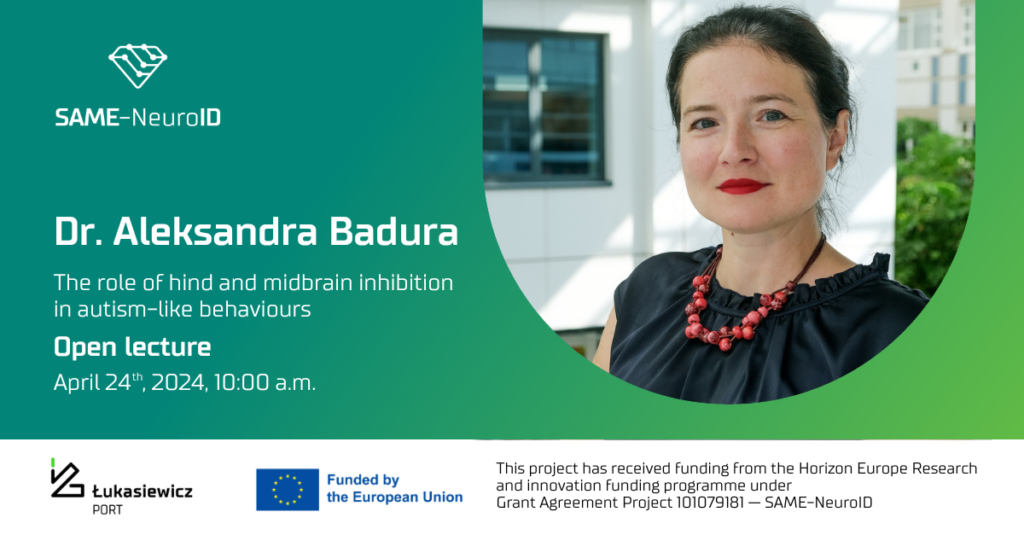SAME-NeuroID project: lecture by Dr. Aleksandra Badura
At Łukasiewicz – PORT Polish Center for Technology Development we will host Dr. Aleksandra Badura, Lab Head in Neural networks underlying behavioral flexibility at Erasmus University MC, Rotterdam, who will deliver a lecture titled “The role of hind and midbrain inhibition in autism-like behaviours”.

Date: April 24, 2024.
Time: 10:00 AM.
Venue: Conference Hall, building A (1st floor).
You can attend it stationary at Łukasiewicz – PORT (147 Stabłowicka Street, Wrocław) or on-line via SAME-Match-Treat platform: SAME-NeuroID Seminar with Aleksandra Badura, PhD | SAME-Match-Treat (b2match.com).
The session will be followed by a Q&A session dedicated to Young Researchers, during which they will have the opportunity to ask our guest for tips on accelerating a research career and navigating potential traps and bottlenecks.
Post-lecture meeting with Young Investigators: 11:00 AM – 12:00 PM.
Seminar title: “The role of hind and midbrain inhibition in autism-like behaviours“.

Abstract:
“Although our understanding of the molecular basis of brain development has advanced over the past decades, the function of many genes that regulate neuronal lineage-specification remains elusive. Recent work from my laboratory has uncovered a potential role for the transcription factor Pax5 and tumor suppressor Tsc1 in regulating the development of mid-brain and hind-brain GABAergic neurons and the role that they play in the development of behavioural deficits later in life.
Specifically, we showed that Pax5 mutant mice display behavioural deficits in all ASD domains similar to patients with PAX5 mutations. PAX5 deficiency also caused profound hypoplasia of the substantia nigra and ventral tegmental area due to loss of GABAergic neurons, thus affecting two midbrain hubs, controlling motor function and reward processing, respectively. Lineage tracing identified Pax5 as a crucial regulator of cerebellar morphogenesis and midbrain GABAergic neurogenesis. Our current studies show electrophysiological changes that are consistent with disinhibition of the midbrain dopaminergic system and a disbalance of excitation/inhibition in the midbrain.
We have also found that at early developmental stages Tsc1 haploinsufficiency leads to dysregulation of transcription factor Pax2. This dysregulation was accompanied by changes in the expression of mTOR pathway-related genes and downstream phosphorylation of S6. Our ongoing studies show that cerebellar inhibitory interneuron development is delayed in Tsc1 mutants compared to controls.
Together, these findings reveal new potential roles of Pax5 and Tsc1 in brain development and unravel the underlying mechanisms of neurodevelopmental delays.”
About Dr. Aleksandra Badura:
Cerebellar pathologies are often found in people with autism, and cerebellar lesions at birth lead to a significant autism-risk. These observations brought Dr. Badura to investigate the role of the cerebellum in autism. She tested the hypothesis that early-life cerebellar insult leads to lasting deficits in adulthood and demonstrated that such early-life manipulations lead to a variety of long-lasting social and flexible behavior deficits in adult mice (Badura et al. 2018). In her laboratory, they develop novel automated methods to test behavioral phenotypes of autism-mouse models (Wahl et al. 2022). By combining mouse models with the patients’ data, her laboratory aims to explain how mutations can lead to both autism and immune deficits. Dr. Badura obtained her PhD in Neuroscience in Erasmus University (the Netherlands) in 2011 and her Master’s Degree in Psychology in Jagiellonian University (Poland) in 2006.
The meeting is organized as part of the SAME-NeuroID project financed by the Horizon Europe program.

